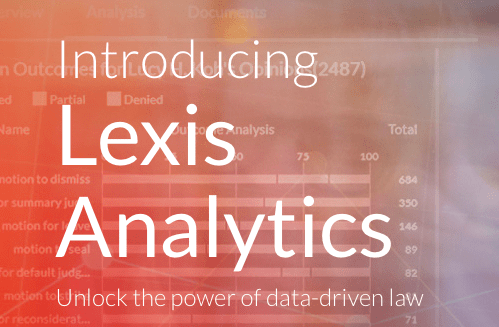
LexisNexis has just announced the launch of Lexis Analytics, its AI-driven legal research tool which integrates the acquisitions of machine learning and NLP startups such as Lex Machina, Intelligize and Ravel Law.
The timing is impeccable, coming directly after Thomson Reuters (TR) launched its own AI-driven research refit of Westlaw in the shape of the new Edge platform.

When great powers go to war (in this case Lexis and TR) and the battle is also joined by the fast-growing startups such as Gavelytics, Casetext and ROSS Intelligence, to name a few, then sparks will fly.
In short, this is going to be intense as multiple players fight it out to become the dominant legal research tool, especially in the US, which is the world’s biggest legal market by a very large margin.
Before looking at what this means, let’s have a quick dip into what Lexis has been able to provide its users after leveraging all that lovely NLP and machine learning capability they bought in over the last few years. There are three main strands:
- Litigation analytics: Enables attorneys to craft winning legal strategies based on quantitative insights and anticipated behaviors and outcomes, and deliver more impactful, persuasive arguments. Analytics products under the litigation umbrella include Lex Machina and a new offering, Context, which identifies the language judges cite most in opinions.
- Regulatory analytics: Allows attorneys to better manage compliance helping them track regulatory developments, predict which laws will pass and understand what to disclose and how to disclose it. Regulatory offerings within Lexis Analytics include Lexis Advance Legislative Outlook and Intelligize.
- Transactional analytics: Empowers attorneys with the latest precedents and clauses to manage transactions more efficiently and effectively. The tools analyze, compare and benchmark the frequency and content of other industry disclosures to help strengthen negotiations and build better deals. Transactional analytics offerings include Intelligize and a new offering, Lexis Search Advantage | Transactional Powered By Intelligize, which applies contract analytics to in-house and firm document collections.
And, to explain why this matters, Lexis got one of their customers to give a nice commendation to the new system. ‘Lexis Analytics will create more value from shared insights, helping attorneys to get a better handle on data and become data-driven lawyers,’ said Steven Geiszler, US Chief Intellectual Property Litigation Counsel at Chinese company, Huawei.
To repeat – it will help lawyers to become ‘data-driven’. And that in a nutshell is what this is all about.
Lawyers are drowning in legal data, case law and more. But, how – in a world where time is still money – do they get much more than surface level value from this trove?
It’s a perfect example of how AI (i.e. in this context the automation of legal tasks using NLP) can deliver. Not only does it provide huge efficiency gains it provides new insights. It goes where humans don’t go, because for a human to trawl so much data like this would be too complex and too time-consuming.
It’s not ‘magic’ to read 10,000 past cases in a certain court, separate out types of cases, certain judges, certain motions, and then make predictions on what a judge in a certain court will say about a certain motion. It’s just data. Lots and lots of unstructured, very complex data. But, doing this is still a huge achievement.
The accomplishment is that Lexis, and TR, and all the startups have in one way or another, whether focused on prediction or not, found ways to deliver new value to lawyers and there is no going back from this. What is happening now will only be built on by successive iterations of other legal AI applications to come. And that is an exciting prospect.
What Does All of This Mean?
So, we have a battle ongoing. And in one of the key areas of legal life: research. What does this tell us?
- Don’t Write Off The Incumbent Tech Co.s – TR and Lexis may be huge, and sometimes quite slow moving. They can also seem from the outside to be so complex and such multi-departmental organisations that it’s unclear what is going on. But there is methodology going on there, out of sight. And the goal is clear: not to let themselves become the dinosaurs of the legal tech world. TR took THREE years to put together Edge, done with its own data scientists. Lexis also took its time to fully integrate the AI acquisitions it had made a while ago.
- Is This War Over? – Can TR and Lexis’s huge marketing budgets and large customer bases create a tsunami that wipes out the new rivals such as Casetext, ROSS and others? Will customers say: ‘Well, now that TR has what the new guys have I can just go back to using Westlaw all the time.’ ? The short answer is: no. No company’s analytics tools perfectly copy the others’ capabilities, each have differing capabilities, differing interfaces, different styles. They also have different pricing structures. And humans like choice. There are over 30 different legal AI doc review systems around the planet and all – for now – make a living. The market is dominated by about four or five, but it’s a big market out there. There is no reason we won’t see even more legal AI driven research platforms. If they can add value and people like their system, then why not?
- Change Drives Change – The startups that scared the Big Two pillars of the legal tech world arrived because they saw a huge innovation gap in how things were done. This can happen again. This is hardly the end of innovation in the legal research space. More change will come. As lawyers digest and get used to what can be done they will – as all humans do – want even more. They’ll want even more predictive insights, they’ll want to add more guidance functions, more decision trees and expert system input. There is always going to be ‘more’ that people want. The Big Two will try to meet that need, but the smaller, more agile, startups will perhaps find it easier to rapidly build out new capabilities. And….who said there won’t be new companies emerging that not even ROSS and peers have heard of today? Markets don’t stand still.
- Lawyers + Clients Are The Winners – The winners here are the lawyers and their clients, who now get a battle to provide them with better insights into legal data, at faster speeds – and perhaps at some point a price war too that does it for less. In fact, how the pricing of all these offerings plays out could be crucial. Either way, tech has seen a need and sought to meet it. And that is what underlines all that is happening in the world of legal AI and automation, i.e. it’s for the legal industry’s and its clients’ benefit. That’s why it works, that’s why it’s spreading and that’s why this is just the beginning of the process of industrialising the legal world. (P.S. this certainly makes the cynics look a bit out of date….)
- Global Expansion – The last point is this: it’s fair to say many of the legal AI-driven legal research companies and platforms are focused on the US legal market, which makes sense, it’s huge. But, once a market sees serious competition then players start to look for new, less intense markets. So where else would you look? The UK, and especially English and Welsh law would be the next obvious choice, given that this is the world’s second largest legal market. Canada would also make sense, given its proximity to the US. In fact, ROSS said recently that it was looking at expanding into new markets, so, let’s wait and see….
To conclude, this is a great example of incumbents getting caught sleeping by smaller, more agile startups, which then drives them to respond. The end result is better services and more competition for the buyers to choose from. And behind all of this….? Legal AI.
What’s not to like?
4 Trackbacks / Pingbacks
Comments are closed.